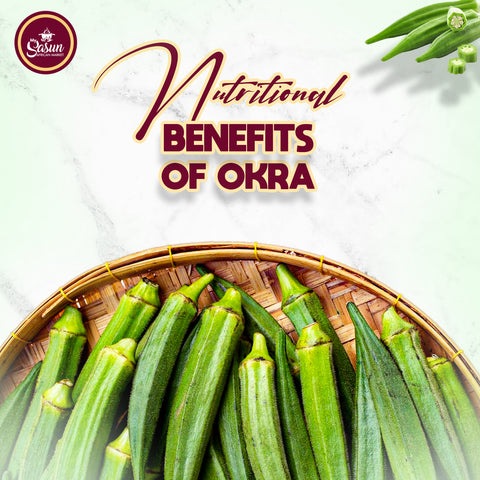The Nutritional Benefits of Okra

Introduction
Okra, also known as lady’s finger or gumbo, is a versatile vegetable widely used in cuisines in Africa and around the world. Not only is okra a delicious addition to various dishes, but it also boasts of impressive nutritional values that can benefit your health in numerous ways. In this article, we’ll explore the nutritional benefits of okra and how you can incorporate it into your diet.
Nutritional Values of Okra
Okra is packed with essential nutrients, making it a valuable addition to a balanced diet. Here’s a breakdown of the key nutrients found in okra:
- Vitamins: Okra is rich in vitamins A, C, and K. It also contains several B vitamins, including B6 (pyridoxine) and folate.
- Minerals: Okra provides important minerals such as calcium, magnesium, potassium, and iron.
- Fiber: Okra is a great source of dietary fiber, particularly soluble fiber.
- Antioxidants: Okra contains powerful antioxidants, including flavonoids, polyphenols, and vitamins C and A
Health Benefits of Okra
Rich in Antioxidants
Antioxidants are compounds that protect your body from damage caused by free radicals. Okra contains several antioxidants, including quercetin, catechins, and epicatechins, which can help reduce oxidative stress and lower the risk of chronic diseases.
Supports Digestive Health
The high fiber content in okra supports healthy digestion. Soluble fiber helps regulate bowel movements by adding bulk to the stool, preventing constipation. Additionally, okra's mucilage, a gelatinous substance, aids in soothing the digestive tract.
Promotes Heart Health
Okra's fiber, particularly soluble fiber, can help lower cholesterol levels by binding to cholesterol in the digestive system and removing it from the body. This process helps reduce the risk of heart disease. Moreover, the antioxidants in okra contribute to cardiovascular health by preventing oxidative damage to the heart.
Aids in Blood Sugar Control
Okra has a low glycemic index, meaning it causes a gradual rise in blood sugar levels. The fiber in okra slows down the absorption of sugar in the digestive tract, which can help manage blood sugar levels. Some studies suggest that okra may have anti-diabetic properties, making it beneficial for individuals with diabetes or those at risk of developing the condition.
Enhances Bone Health
Okra is a good source of vitamin K, which is essential for bone health. Vitamin K plays a crucial role in bone mineralization and helps improve calcium absorption, thereby reducing the risk of fractures and osteoporosis.

Supports Immune Function
The high vitamin C content in okra boosts the immune system by stimulating the production of white blood cells, which are essential for fighting infections. Additionally, vitamin C acts as an antioxidant, protecting immune cells from damage by free radicals.
Promotes Skin Health
Vitamins A and C in okra contribute to healthy skin. Vitamin A supports skin cell production and repair, while vitamin C aids in collagen formation, keeping the skin firm and youthful. Antioxidants in okra also help reduce inflammation and prevent damage from UV radiation.
How to Incorporate Okra into Your Diet
Okra, also known as “okro” or “ladies’ fingers,” is a warm-season vegetable widely used in African cuisine. Here are some delightful African okra recipes you might enjoy:
Super Kanja:
A popular dish in an African country (which one, you ask? It’s Superkanja!), Super Kanja is made with okra, meat (usually goat or beef), and various spices. It’s a flavorful stew that pairs well with rice or fufu.
Ila Alasepo:
This Nigerian dish features okra cooked with palm oil, assorted meats, and spices. It’s often served with pounded yam or eba (cassava fufu).
Miris Otong Soup:
This is a traditional okra soup from the Efik people of Cross River, South Eastern Nigeria. This soup is known for its rich, flavorful taste and is quite similar to the Yoruba Okra Soup, Ila Alasepo. The main difference is the addition of Ugu leaves (pumpkin leaves), which can be substituted with spinach, water leaves, or kale if needed.
Muamba De Galinha:
This is a traditional Angolan chicken stew, rich in flavor and often enjoyed during special family meals. The dish is made with chicken, garlic, chili, vegetables, and cooked in palm oil, giving it a unique and aromatic taste. It’s typically served with funge (a type of cornmeal porridge).
Conclusion
Okra is a highly nutritious vegetable that offers numerous health benefits, from supporting digestive health to boosting the immune system. Its versatility in the kitchen makes it easy to incorporate into a variety of dishes. By adding okra to your diet, you can enjoy its delicious flavor while reaping the many health benefits it provides. You can get the best and freshest ingredients for all your African foods at My Sasun African Store, the number one African grocery store in the US and Canada.









































